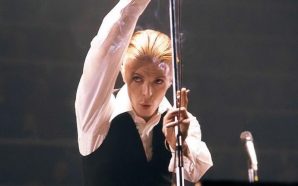DETAILS
- Directed by: Uli Edel
- Produced by: Bernd Eichinger, Hans H. Kaden, Hans Weth
- Written by: Herman Weigel, Kai Hermann, Horst Rieck
- Starring: Natja Brunckhorst, Thomas Haustein
- Music: Jürgen Knieper, David Bowie
- Cinematography: Jürgen Jürges, Justus Pankau
- Edited by: Jane Seitz
- Released: 2 April 1981
- Running time: 138 minutes
- Language: German
- Budget: $2.7 million
ABOUT
Christiane F. – Wir Kinder vom Bahnhof Zoo is a 1981 German film directed by Uli Edel that portrays the drug scene in West Berlin in the 1970s, based on the non-fiction book of the same name written following tape recordings of teenage girl Christiane F. The movie immediately acquired cult status (which it still retains today) and features David Bowie as both himself and the soundtrack composer, which gave the movie a commercial boost.
The film is based on a book by Christiane Vera Felscherinow, who was born on 20 May 1962 in Hamburg. Her family moved to West Berlin when she was a child, and settled in Gropiusstadt, a neighbourhood in Neukölln that consisted mainly of high-rise concrete apartment blocks where social problems were prevalent. Felscherinow’s father frequently drank heavily and was abusive towards his two daughters, while her mother was absorbed by an extra-marital relationship.
When she was 12 years old, she began smoking hashish with a group of friends who were slightly older at a local youth club. They gradually began using stronger drugs such as LSD and various forms of pills, and she ended up trying heroin. By the time she was 14, she was heroin-dependent and a prostitute, mainly at West Berlin’s then-largest train station Bahnhof Zoo. During this period she became part of a group of teenage drug-users and sex workers of both sexes.
The book came about when two journalists from the news magazine Stern, Kai Hermann and Horst Rieck, met Felscherinow in 1978 in Berlin when she was a witness in a trial against a man who paid underaged girls with heroin in return for sex. The journalists wanted to disclose the drug problem among teenagers in Berlin, which was severe but also surrounded by strong taboos, and arranged a two-hour interview with Felscherinow. The two hours extended to two months, as Felscherinow provided an in-depth description of her life, as well as those of other teenagers, in West Berlin during the 1970s. The journalists subsequently ran a series of articles about her heroin use in Stern, based on the tape-recorded interviews with Felscherinow.
Stern eventually decided to publish the articles as the book Christiane F. – Wir Kinder vom Bahnhof Zoo in 1979. The book chronicles Felscherinow’s life from 1975 to 1978, between the ages of 12 and 15 years, and depicts several of Felscherinow’s friends, along with other drug users, as well as scenes from typical locations of the Berlin drug scene at the time. The narrative of the book is in the first person, from Felscherinow’s viewpoint, but was written by the journalists functioning as ghostwriters. Others, such as Felscherinow’s mother and various people who witnessed the escalating drug situation in Berlin at the time, also contributed to the book.
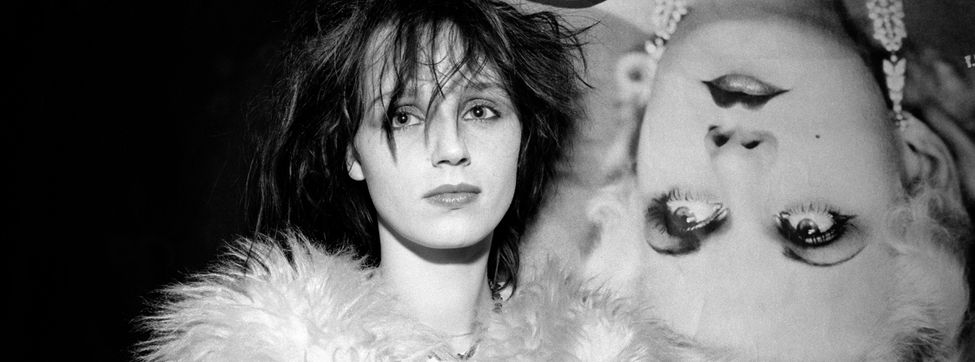
Christiane Vera Felscherinow in the 1980s
The American issue of the book was released by Bantam in 1982 under the title Christiane F.: Autobiography of a Girl of the Streets and Heroin Addict and was translated by Susanne Flatauer (ISBN 0553208977). As of October 2013, Felscherinow continued to receive monthly royalty payments of €2,000 (US$2,720) for the book Christiane F.
In 1981 the book was made into a film, directed by Uli Edel and produced by Bernd Eichinger and Hans Weth. The screenplay was written by Herman Weigel, with Natja Brunckhorst playing the role of the titular character. Its title in Germany was Wir Kinder vom Bahnhof Zoo (The Children of Zoo Station), and in English-speaking countries Christiane F.
Much of the movie is shot in the actual surroundings of Gropiusstadt and Bahnhof Zoo. David Bowie, Christiane’s favourite singer at the time of the interviews that informed the book, appears as himself in concert during the film. Bowie also provided the movie’s soundtrack that was released in 1981.
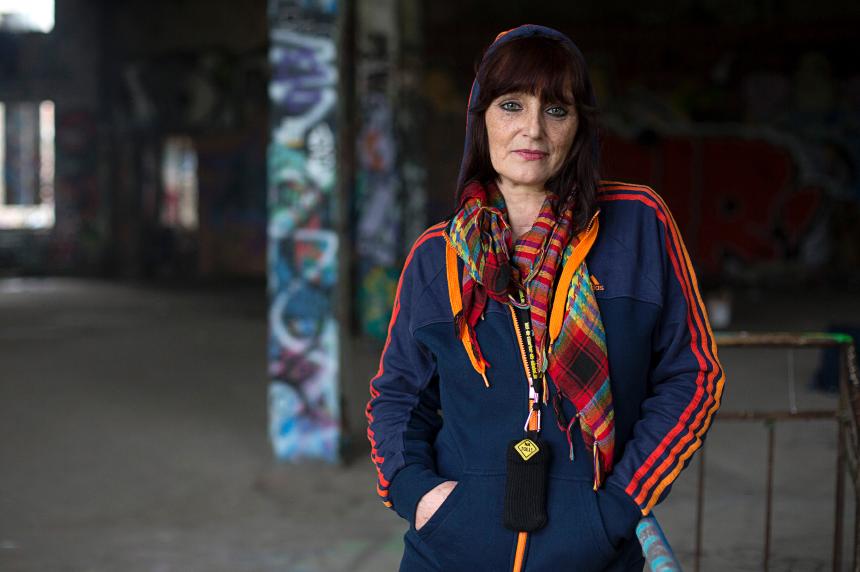
Christiane Vera Felscherinow in 2013
In a December 2013 interview, Felscherinow stated that she attended the German premiere of the film with Bowie, who picked her up in a chauffeured limousine: “I thought David Bowie was going to be the star of my movie, but it was all about me.” Felscherinow agreed that the film was an accurate portrayal of her life at the time, but revealed that she does not like the film “that much”:
… it doesn’t describe how I grew up, how I was neglected by my parents. My father was a drinker and he abused my sister and me. He was choleric and my mom just did nothing, She was more into her affair with another man and her beauty. I was so lonely when I was a kid. I just wanted to belong; I was struggling with the world.
Both the movie and the book acquired cult status in Europe immediately after release, raising awareness of heroin addiction. The popularity of the movie was greatly boosted by Bowie’s participation.
However, the film shocked European audiences. Awareness of the heroin plague that swept Western Europe between the mid-1970s and the early 1980s was virtually non-existent, so the film’s release was the first many knew of the epidemic that was killing a large number of European teenagers. The film depicted heroin addiction in very realistic detail: hustling and scoring, shooting up, the effects of withdrawal, the scars caused by shooting up and the extreme weight loss due to appetite suppression.
Christiane and her cohorts are seen losing consciousness in decrepit lavatory cubicles amidst urine, vomit and blood, injecting in close-ups, cleaning and re-filling syringes directly from the toilet bowl, vomiting all over themselves and falling asleep right on top of it. The depiction of young addicts from seemingly normal families was particularly alarming: at the time junkies were still perceived in popular culture as much older, wilder characters, such as those depicted in Dennis Hopper’s Easy Rider or in Lou Reed’s songs. Christiane turns 14 halfway through the film, the same age as her friend Babsi, who fatally overdoses. Christiane’s boyfriend in the film is 15, portrayed by a 14-year-old actor. None of their companions, two of whom also fatally overdose, are older than 16, as reported in the end titles recalling the birth and death dates of the real-life individuals portrayed in the movie. The fact that the characters prostitute themselves to obtain drugs, both hetero- and homosexually, and at such a young age, revolted audiences.
The movie was shot with a low budget in 1980 and released in 1981, but set between 1975 and 1977 in West Berlin. It skips the beginning and the end of the book, and concentrates on the main story, starting when Christiane begins her nightlife in Berlin at around 13 years old, and stops rather abruptly after her suicide attempt by stating that she recovered. In real life, Christiane’s troubles didn’t end with going to Hamburg to begin withdrawal – she has been plagued by addiction to the present day.
Originally the movie was going to be directed by Roland Klick, but after a long preparation he was fired only two weeks before shooting, after a fallout with Bernd Eichinger, and Uli Edel came in to direct the movie
The cinematography is bleak and dreary, depicting a dilapidated, working-class Berlin with rundown structures and dirty, blighted backdrops. Modern Berlin is very different and most of the landmarks from the movie (the station, the Bülow street stalls, the Sound discothèque) have either been demolished or completely remodeled.
The cast is composed mainly of first-time actors, most of whom were still in school at the time and didn’t pursue acting careers. Natja Brunckhorst is the only cast member who continued to act in German movies and television, starting with 1982’s Querelle by Rainer Werner Fassbinder, another exploitation film. Most of the extras at the railway station and at the Sound club were actual junkies, prostitutes and low-lifes rounded up by producers just for the crowd scenes. In the scene where Christiane runs through the alleys of the station to find Babsi, the camera lingers on several terminal junkies leaning against the walls of the underpass.
In a 2011 interview, Thomas Haustein, who plays Detlev and was still in school at the time, recalls how terrified he felt being surrounded by all those real-life addicts, but that he was able to successfully copy their behaviour for his character. It would be illegal to have minors act in the film’s graphic shootup, nudity and sex scenes today; at the time, however, all the production needed was a written letter of consent from the parents to proceed with filming.
SOUNDTRACK
The soundtrack to Christiane F. draws from Bowie’s previous four albums: – Station To Station, Low, “Heroes” and Lodger:
- V-2 Schneider (Bowie)
- TVC 15 (Bowie)
- Heroes/Helden (Bowie/Eno/Maas)
- Boys Keep Swinging (Bowie/Eno)
- Sense of Doubt (Bowie)
- Station to Station (Live) (Bowie)
- Look Back in Anger (Bowie/Eno)
- Stay (Bowie)
- Warszawa (Bowie)
BOWIE'S PERFORMANCE
According to the book, Christiane had her first experience with heroin at a David Bowie concert, and this is featured in the film with David Bowie performing ‘Station To Station’.
Director Ulrich Edel shot the concert footage in October 1980 at New York’s Hurrah Club, which was redressed to resemble a Berlin nightclub, as Bowie was appearing nightly on Broadway in The Elephant Man at the time. Because of this the mass concert scenes were actually filmed at an AC/DC concert in Germany.
The band features the same musicians (Carlos Alomar, G. E. Smith, John Kumnick, Steve Goulding) that appeared with Bowie during his Tonight show performances of ‘Life On Mars?‘ and ‘Ashes To Ashes‘, and in the music video for ‘Fashion’, which was also filmed at the Hurrah Club.
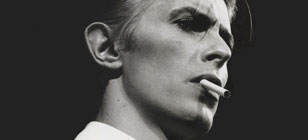
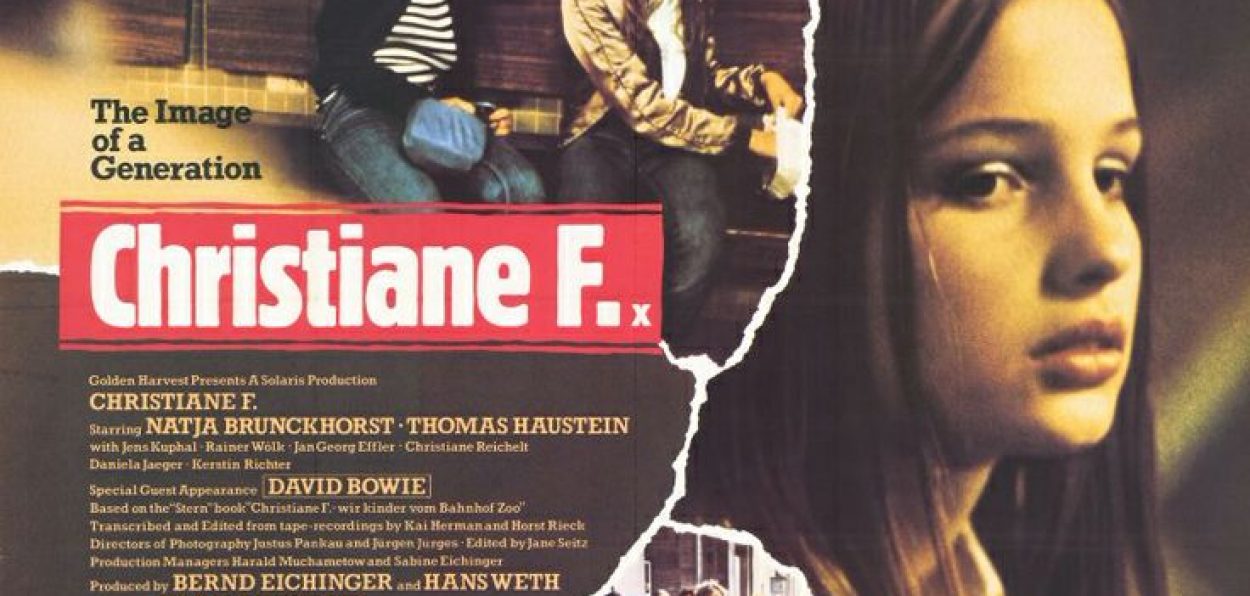
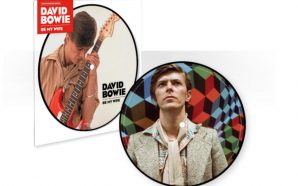
![David Bowie Who Can I Be Now [1974 - 1976] box-set cover crop](http://dl5aqhbhorw7d.cloudfront.net/wp-content/uploads/2016/07/david-bowie-who-can-i-be-now-1974-1976-crop-298x186.jpg)
